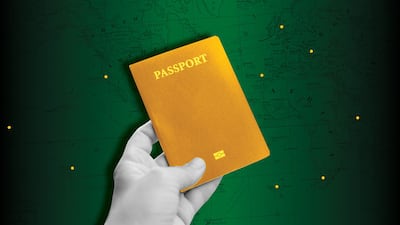Why should an accident of birth determine your rights and privileges? At a time when social media reinforces the idea that we can be anything we want, why should the citizenship we are born with determine where we live, love and retire?
These fundamental questions have encouraged the rise of an industry valued at $21.4 billion annually, according to 2019 statistics by Investment Migration Insider, a publication focused on the residence and citizenship-by-investment sector. By 2025, the magazine predicts the market could generate $100bn in revenue.
“I like the idea of not being shackled by the restraints of whatever default citizenship a person was born with,” says entrepreneur and businessman Romy Hawatt, founder, executive chairman and owner of the Riana Group in Dubai.
founder, executive chairman and owner of Riana Group
“Most of the world’s population is restricted by circumstances of their birth due to geography, nationality of parents and/or a passport they are entitled to. In these circumstances, it is understandable why most would want to emigrate to seek out a better life.”
Mr Hawatt’s parents were migrants, moving to Australia from Lebanon after the Second World War.
“Their move paved the way for me, my siblings and my offspring to have had the good fortune to be able to pick and choose — to a large extent — where we reside and live,” he says.
The long-time Dubai resident now has Australian citizenship by birth and the rights to Lebanese citizenship by ancestry.
“I also have a Montenegrin passport and citizenship as a result of investment — economic citizenship — that was awarded given the level and type of investments I have made into Montenegro,” he says.
“To date, I have invested about €22 million [$24.8m] into various projects, including real estate to aviation education and training, helicopter scenic and charter services, destination management, food and beverage and other projects in Montenegro.”
The picturesque Balkan nation, about four times the size of Dubai, is one of more than 100 countries that now offers some kind of investment migration programme.
The cost of a golden visa
The price tag for a second citizenship (popularly referred to as a “golden passport”) or permanent residence (“golden visa”) range from $100,000 to $2.5m, the International Monetary Fund says.
Such programmes date back at least to the 1980s, when low tax havens in the Pacific and Caribbean began to attract wealthy foreigners.
Canada and the US were among other early adopters but immigrant investor initiatives have exploded in the decades since, with countries using the funds as a source of foreign investment to stimulate economic development or replenish government coffers after natural disasters.
Programmes have been launched by Austria, Bulgaria, Cyprus, Egypt, Malta, Portugal, South Korea, Thailand, the UAE, the UK, Vanuatu and, most recently, Bahrain, among others.
Some countries require direct donations to government development funds. Others mandate contributions to specific government debt instruments or investments in specific sectors, such as property or construction, while others offer golden visas for those establishing businesses and creating jobs.
Financing terms for such initiatives may include upfront payments, instalments or bank loans.

Last summer, Porto Montenegro, the Adriatic waterfront development from the Investment Corporation of Dubai, teamed up with UAE developer Nakheel to promote citizenship by investment at its new Boka Place district.
Foreigners can acquire Montenegrin nationality by admittance after they donate €200,000 to specified government development and innovation funds, in addition to investing at least €450,000 in a government-approved property development, such as Boka Place.
Although the new complex will not be ready until 2023, more than 100 units were reserved or sold after the announcement, says David Margason, managing director of Porto Montenegro.
“The interest has been spread across our citizenship and non-citizenship products, with investors clearly recognising the solid real estate fundamentals of yield and capital growth represented by a prime coastal property at Porto Montenegro — whether citizenship is important to them or not,” he says.
Investors buying a Boka Place property may also purchase one or more hospitality residences nearby to meet the minimum investment threshold.
Porto Montenegro works together with licensed application agencies to support applicant investors in assembling, making and then following up on their citizenship application, he says.
“The licensed agencies advise on all aspects of the compliant investment and application process and can guide applicants towards legal, accounting and escrow banking advisers as necessary.”
The promotion runs until the end of 2022, after a recent extension of Montenegro’s golden passport programme.
Investing in Montenegro could be attractive to buyers because the country expects to be ready to join the EU by 2025.
Should the bloc's 27 members approve its candidacy, Montenegrins will be able to live and work anywhere across EU. The country’s citizens already enjoy visa-free or visa-on-arrival travel to 124 countries and can apply for E-2 investor visas to work and live in the US.
Rising property demand in such developments resonates with the global property boom — as well as with an increase in demand for citizenship by investment after the coronavirus pandemic.
How the pandemic fuelled demand
Given the sector’s overall opacity, there are few statistics on the aggregate number of people pursuing such programmes, but companies that help in making such investments have reported an increase in demand for second passports — particularly during the pandemic.
Requests from high-net-worth individuals (HNWIs) in advanced economies have risen sharply, with demand further fuelled by discounts offered by some countries, the IMF noted.
Even before the pandemic, the market was growing at 23 per cent a year, according to IMI magazine’s estimates.
Citizenship Invest, an advisory company specialising in programmes for residence and citizenship by investment across several countries, says it has received about 15,650 inquiries since the pandemic began two years ago, a 43.9 per cent increase compared with the 10,880 received during the previous two-year period of 2018 and 2019. In total, about 60 per cent of inquiries came from the Middle East.
“This crisis has given people quality time to reflect about essential issues, about their lives and in what position they want to be if this was to happen again,” says Veronica Cotdemiey, chief executive of Citizenship Invest.
“People have realised that they strongly need a Plan B — no matter if they have solid jobs or businesses, as this goes beyond financial security.”

Many HNWIs found themselves trapped in their home countries during the pandemic and were unable to take their families to countries with better infrastructure and amenities because they did not have the requisite visas, Ms Cotdemiey says.
“Their passports did not allow them to move. This has triggered the sense of urgency in many people and they are finally taking the plunge to acquire a second citizenship and passport so as to never be in this situation again. The power of having a strong passport in times of crisis is the ultimate insurance policy,” she says.
Travel, education, health — and tax benefits
Rising up the global passport pecking order can have significant benefits.
In terms of travel alone, Iraq, for example, ranks 90 on a real-time Passport Index created by the investment migration agent Arton Capital in Canada. That means an Iraqi citizen needs a visa for 161 countries.
By contrast, St Kitts & Nevis is placed 24th and its citizens require visas for only 73 countries.
A five-year residence visa for Portugal, on the other hand, offers the holder and their immediate family the right to travel anywhere within the EU and the associated Schengen nations of Iceland, Norway, Switzerland and Liechtenstein.
But there are also education and healthcare advantages to levelling up in the golden passport game. Portuguese residents are eligible for lower university tuition fees for some courses in Portugal and across the EU, for example.
a dual citizenship expert
Similarly, the UAE was among the first to make coronavirus vaccines available to its residents, for example.
“As Covid spread, states locked down their borders. But almost all of them continued to allow entry by citizens [and in many cases permanent residents as well],” says Peter J. Spiro, a dual citizenship expert who holds the Charles Weiner Chair in international law at Temple University in Philadelphia, in a note accompanying the 2022 Henley Passport Index.
“So, dual citizenship now has value even to those holding premium passports. It has emerged as a kind of insurance that has value regardless of one’s primary nationality. In the pandemic context, it also acted as a health insurance. The more citizenships one holds, the more diversified one’s insurance will be.”
The number one priority for applicants from the Middle East is freedom of mobility — a statistic that chimes with reports from other agencies, Ms Cotdemiey says.
But those looking to acquire a second citizenship or residency put a premium on safety and security, wealth preservation and low taxes, reliable governments and quality of life, she says.
Tax considerations are perhaps the major reason for seeking a new nationality. Some investment migration jurisdictions appeal because of low rates of income tax.
In other cases, where minimum residency requirements do not apply, investment migrants may be able to enjoy non-domiciled status by declaring their permanent home to be outside their new country.
“Countries which offer a second citizenship by investment have certain characteristic advantages, for example, they do not impose income tax unless the person becomes a tax resident of the particular country of citizenship,” Ms Cotdemiey says.
“The mere fact of having the citizenship does not make them liable for taxation, otherwise these programmes would not be attractive.”
For the dual citizen, at least, those benefits come with several drawbacks — such as the expense, the potential for double taxation, possible revocation of nationality and being bound by the laws of two nations.
Whether the disadvantages outweigh the benefits remains a personal decision.
11 golden visa countries
- UAE
- Australia
- Bahrain
- Bulgaria
- Greece
- Malta
- Monaco
- Portugal
- Spain
- Thailand
- US
10 golden passport countries (as of March 1, 2022)
- Austria
- Antigua and Barbuda
- Dominica
- Jordan
- Grenada
- Montenegro
- North Macedonia
- St Kitts and Nevis
- Turkey
- Vanuatu

